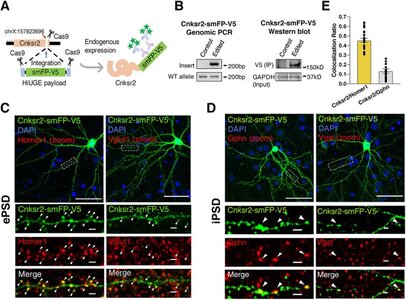Celebrating 200,000 Product Citations
Thank you for helping us reach 200,000 citations of Proteintech products
We are thrilled to have reached 200,000 citations of Proteintech products.
We would like to thank everyone who has purchased and published with us. We are so proud of the achievements of our customers and honored to play a part in contributing to scientific knowledge.
Celebrating your science
In honor of reaching the 200,000 citation milestone we asked members of our scientific team to highlight their favorite publication from our customers.

Dr. Christian Linke-Winnebeck, Principal Scientist
Chosen paper: OpenCell: Endogenous tagging for the cartography of human cellular organization. Cho et al., 2022, Science. PMID: 35271311
"This paper describes a massive endeavour to map 1310 human protein using microscopy and proteomics. To this end, Cho et al. tagged these proteins at endogenous levels with split-mNeonGreen using CRISPR/Cas. They used the ChromoTek mNeonGreen-Trap Magnetic Agarose to perform high-throughput immunoprecipitation followed by mass spectrometry (IP-MS) for all 1310 proteins. The authors deposited their massive datasets in the newly created database OpenCell, a huge boon to biomedial science. It is great to see this example how ChromoTek NanoTraps enable proteomics analyses from single, manual IPs to automated high-throughput studies."
Learn more about Proteintech Nano-Traps here
Dr. Swati Roy, Product manager
Chosen paper: Human hematopoietic stem cell vulnerability to ferroptosis. Zhao et al., 2023, Cell. PMID: 36803603
“This paper highlights a unique physiologic role of ferroptosis, a recently emerged form of regulated cell death, in human hematopoiesis. While previous studies have demonstrated the role of ferroptosis in various pathological contexts, the susceptibility of distinct cell populations to ferroptosis in physiologic settings remains unidentified.
In this paper, the authors modelled a rare bone marrow failure disorder to demonstrate that reduced protein synthesis in human hematopoietic stem cells makes them more susceptible to ferroptosis. This study not only expands our understanding of the role of ferroptosis under normal physiological conditions, but also brings into light factors that need consideration when developing cancer therapies that target ferroptosis.
It was an honor for Proteintech to have 12 of its antibodies cited in this remarkable study.”
Try our sampler kits for ferroptosis here


Dr Rebecca Northeast, Product Manager and Scientific Liaison
Chosen paper: Divergent transcriptional regulation of astrocyte reactivity across disorders. Burda et al., 2022, Nature. PMID: 35614216
"This paper was a huge milestone in neuroscience research, showcasing that glia can no longer be considered as just “the inert glue of the nervous system”, but instead have a differential response across a range of disorders and thus has wide reaching implications for future therapies.
Burda and colleagues used a staggering 34 Proteintech antibodies(!) in this paper and we are humbled to play a part in such important research. "
Discover our neuroscience resources here
Larisa Yurlova, PhD, Principal Scientist
Chosen paper: Cytoplasmic control of intranuclear polarity by human cytomegalovirus. Procter et al., 2020, Nature. PMID: 32908309
"A beautiful cell biology paper uncovering the extent to which viruses can control and reorganize cell nucleus. The authors acquired fascinating videos showing appearance and redistribution of nuclear actin filaments, as visualized with ChromoTek nuclear Actin Chromobody upon infection of cells with a human cytomegalovirus. Here, the Histone Chromobody was also employed to visualize chromatin. The authors suggest that the observed nuclear actin dynamics indicates an important role played by nuclear actin during the nuclear rotation phase of infection to establish polarity. "


Annika Dalheim, Senior Scientist in Flow Cytometry
Chosen paper: Lipid Nanoparticle Delivery System for mRNA Encoding B7H3-redirected Bispecific Antibody Displays Potent Antitumor Effects of Malignant Tumors. Huang et al., 2023, Advanced Science. PMID: 36403209
"Tumor immunotherapy continues to be an area of research with progressive discoveries and exciting results in many types of cancers. Huang et al. show compelling antitumor effects in hematological malignancies and melanoma using a bispecific antibody for a new immunotherapy target encoded in mRNA and a lipid nanoparticle delivery system.
This paper used Proteintech flow antibodies to show an increase in tumor-infiltrating T cells using this therapy in vivo, an important indicator of therapeutic efficacy. "
Discover products for Flow Cytometry here
Sabrina Wendler, Scientist
Chosen paper: Cnksr2 Loss in Mice Leads to Increased Neural Activity and Behavioral Phenotypes of Epilepsy-Aphasia Syndrome. Erata et al., 2021, J Neurosci. PMID: 34580165
"Epilepsy Aphasia Syndromes (EAS) are diverse genetic epilepsy syndromes. Erata et al. developed a Cnksr2 KO mouse line, which helped to prove that loss of CNKSR2 leads to EAS and improved our understanding of the roles of Cnksr2 in synaptic organization and neuronal network activity.
The authors used the ChromoTek V5-Trap® Magnetic Agarose to enrich the low-abundant Cnksr2-smFP-V5 fusion protein via IP for in depth characterization of Cnksr2 in context with EAS. "
